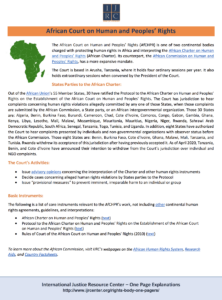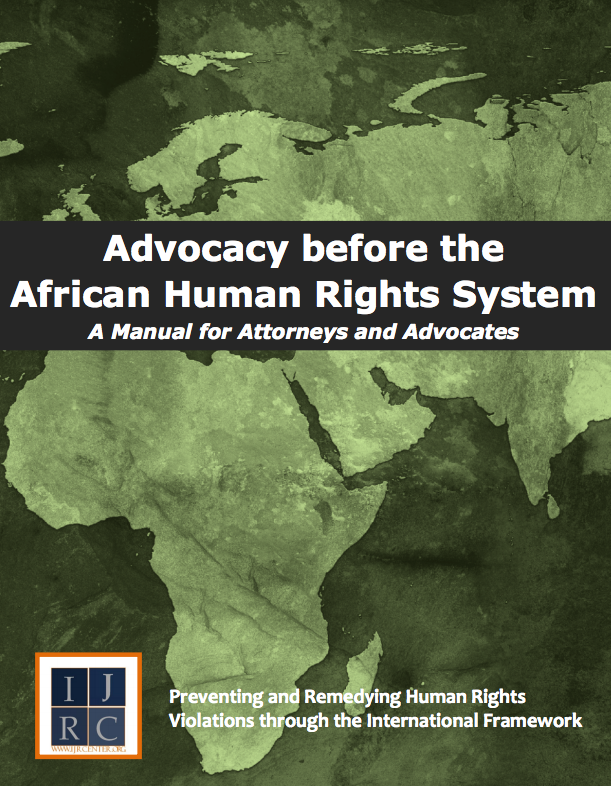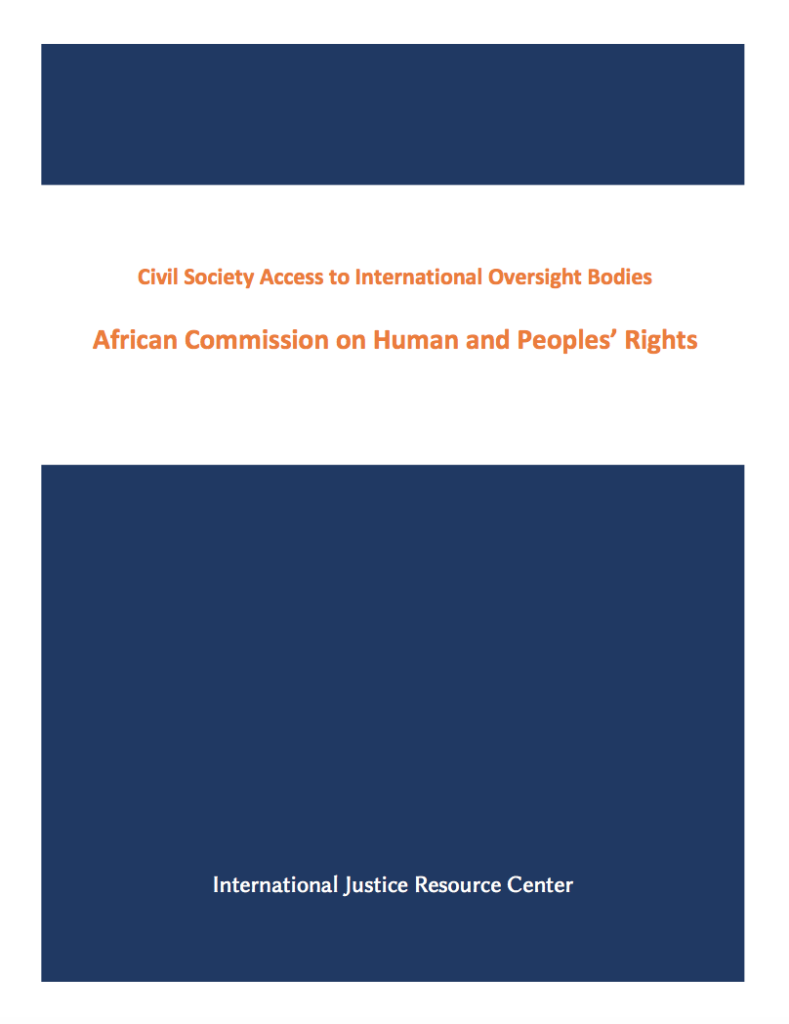The African System is the youngest of the three judicial or quasi-judicial regional human rights systems, and was created under the auspices of the African Union (AU). Like the Inter-American System (and the European System, as originally designed), it includes a commission and a court with complementary mandates. The African Commission on Human and Peoples’ Rights (ACHPR), African Court on Human Peoples’ Rights (AfCHPR), and African Committee of Experts on the Rights and Welfare of the Child (ACERWC) all assess States’ compliance with human rights standards, including by deciding individual complaints of human rights violations. However, the jurisdiction and activities of each body are distinct.
 For quick reference, view IJRC’s one-page overviews of the AfCHPR, ACHPR, and ACERWC, as well as two-page country factsheets on the human rights obligations of the 55 AU Member States. View IJRC’s exhaustion guide for an overview of how the African human rights bodies interpret and apply the procedural requirement of exhaustion of domestic remedies in their complaints processes.
For quick reference, view IJRC’s one-page overviews of the AfCHPR, ACHPR, and ACERWC, as well as two-page country factsheets on the human rights obligations of the 55 AU Member States. View IJRC’s exhaustion guide for an overview of how the African human rights bodies interpret and apply the procedural requirement of exhaustion of domestic remedies in their complaints processes.
IJRC’s publication Advocacy before the African Human Rights System: Manual for Attorneys and Advocates (2016) provides detailed information on the System, its components, complaints procedure, and decisions. The manual addresses the continental human rights bodies, as well as regional courts engaged in human rights protection. It also contains a list of additional books, articles, and websites with information and analysis relevant to understanding the African human rights bodies’ work.
IJRC’s publication Civil Society Access to International Oversight Bodies: African Commission on Human and Peoples’ Rights (2018) analyzes the opportunities and barriers to civil society engagement with the ACHPR, as part of a series on advocates’ access to human rights oversight bodies.
Contents
African Court on Human and Peoples’ Rights
Seat: Arusha, Tanzania Instrument: Protocol to ACHPR Operating Since: 2006
The African Court on Human and Peoples Rights (AfCHPR) is a regional human rights tribunal with advisory and contentious jurisdiction concerning the interpretation and application of the African Charter on Human and Peoples’ Rights (“Banjul Charter”) and other instruments. Its jurisdiction extends to those States that have ratified the Protocol to the African Charter on Human and Peoples’ Rights on the Establishment of an African Court on Human and Peoples’ Rights. In addition to deciding cases, the Court may issue advisory opinions and adopt thematic reports.
The AfCHPR issued its first judgment, in the case of Yogogombaye v. Senegal, in December of 2009 and has taken up more than 300 other cases since then. The Court may decide complaints against any State party to the Protocol that are referred to it by: the African Commission on Human and Peoples’ Rights; a State party (as respondent or petitioner in a case before the Commission, or on behalf of a individual citizen); or, African intergovernmental organizations.
As of November 2021, 32 States have accepted the Court’s jurisdiction by ratifying the Protocol establishing the Court. These States are: Algeria, Benin, Burkina Faso, Burundi, Cameroon, Chad, Côte d’Ivoire, Comoros, Congo, Democratic Republic of Congo, Gabon, Gambia, Ghana, Guinea Bissau, Kenya, Libya, Lesotho, Mali, Malawi, Mozambique, Mauritania, Mauritius, Nigeria, Niger, Rwanda, Sahrawi Arab Democratic Republic, South Africa, Senegal, Tanzania, Togo, Tunisia, and Uganda. See AfCHPR, Basic Information. The Democratic Republic of Congo became the 31st State to ratify the Protocol, in December 2020, followed by Guinea Bissau in November 2021. [AfCHPR]
To see the most recent ratification information, visit the African Union’s Treaties, Conventions, Protocols & Charters webpage.
Jurisdiction over Individual Complaints
The Court also has jurisdiction to hear cases brought by individuals and non-governmental organizations with observer status before the African Commission, but only when the relevant State has accepted this jurisdiction by making a declaration under Article 34 of the Protocol.
As of November 2021, the Court has jurisdiction to receive complaints by individuals and NGOs against eight States: Burkina Faso, the Gambia, Ghana, Guinea Bissau, Malawi, Mali, Niger, and Tunisia.
Four States withdrew their acceptance of the Court’s jurisdiction over individual and NGO complaints, between 2017 and 2021. Those States are: Rwanda, Tanzania, Côte d’Ivoire, and Benin [IJRC: Rwanda; IJRC: Tanzania; IJRC: Benin and Côte d’Ivoire] The Court has determined that such withdrawals are permissible and take effect one year after notification by the State. See AfCHPR, Ingabire Victoire Umuhoza v. Rwanda, App. No. 003/2014, Ruling on Jurisdiction of 3 June 2016, paras. 67-68.
Composition
The 11 judges of the court are elected for renewable, six-year terms. The Protocol to the African Charter on Human and Peoples’ Rights on the Establishment of an African Court on Human and Peoples’ Rights, along with the AfCHPR’s Rules of Court, set out the Court’s functions and operating procedures. To read more about the judges and their election process, see our AfCHPR Composition & Election guide.
In July 2020, the AU Assembly was scheduled to elect four judges to the Court; three of the four judges whose terms are expiring are eligible for reelection. This election has apparently been postponed due to the COVID-19 pandemic. In June 2018, four seats on the Court were filled in an election. To read about the candidates and election process, see our two-page overview.
African Court of Justice and Human Rights
Additionally, the States of the African Union have adopted two protocols that would replace the AfCHPR with a new African Court of Justice and Human Rights, intended to hear disputes arising under all African Union instruments, and give that new court jurisdiction to prosecute individuals for serious international crimes. However, neither of the two protocols has been ratified by the required 15 States.
African Commission on Human and Peoples’ Rights
Seat: Banjul, The Gambia Instrument: ACHPR Operating Since: 1987
The African Commission on Human and Peoples’ Rights (ACHPR) promotes and protects human rights in the 54 Member States of the African Union that have ratified the African Charter on Human and Peoples’ Rights. Morocco rejoined the African Union in 2017, becoming its 55th Member State, but has not yet ratified the African Charter. [IJRC]
The African Charter and the Commission’s Rules of Procedure establish its composition and procedures. The Commission is composed of 11 Commissioners, who are elected in their individual capacity and do not represent any State. To read more about the Commissioners and their election process, see our ACHPR Composition & Election guide.
The Commission accepts complaints (“communications“) from individuals, groups of individuals, non-governmental organizations, and States concerning alleged violations of the African Charter on Human and Peoples’ Rights. It may also issue general comments and other guidelines and principles interpreting African human rights standards. The ACHPR periodically reviews States’ reports on their implementation of the Charter and issues concluding observations.
The ACHPR holds two ordinary sessions a year and may also hold extraordinary sessions upon the request of the Chairperson of the Commission or a majority of Commissioners. During the biannual ordinary sessions, the ACHPR considers periodic reports submitted by States parties, as well as reports from members of the Commission and its Special Mechanisms (rapporteurs, committees, and working groups). The Commission also considers reports concerning country visits (“Special Missions”), which are typically dispatched to countries experiencing political or social unrest, and may conduct promotional missions in African Union Member States to promote the African Charter and other regional and international legal instruments on human rights, and to strengthen relations between the Commission and the relevant State.
ACHPR Rapporteurs and Working Groups
The African Commission on Human and Peoples’ Rights has established multiple special mechanisms to assist the Commission with the promotion and protection of human rights. The special mechanisms’ mandates extend to all African Union (AU) Member States who are States parties to the African Charter on Human and Peoples’ Rights. Fifty-four of 55 AU Member States are States parties to the Charter. The special mechanisms are dedicated to protecting and promoting specific rights or the rights of specific vulnerable groups.
The ACHPR has established various working groups, special rapporteurships, and committees to advance specific thematic areas of work and to guide its functioning. The responsibilities of these special mechanisms include gathering and disseminating information on respect for the human rights of certain vulnerable groups. The special mechanisms use this information to provide States or the Commission with guidance toward effectively securing human rights in Africa.
Each special mechanism has been overseen by one of the Commission’s 11 Commissioners, who undertakes his or her duties on a part-time basis. Each individual appointed as Special Rapporteur or as Chairperson to a Working Group or Committee has been a Commissioner, simultaneously serving on the Commission. Commissioners also serve as members of the Working Groups and Committees, alongside non-Commissioner expert members.
The special mechanisms have a duty to provide the Commission with reports on their activities during each Ordinary Session. In turn, the Commission presents annual Activity Reports to the African Union Assembly that contain information gathered from the special mechanisms, summarizing positive developments and areas of concern regarding human rights in Africa.
In 2020, the ACHPR adopted Standard Operating Procedures for its special mechanisms. [IJRC]
Principal Functions
Each special mechanism has a specific mandate. Generally, special mechanisms may:
- conduct country visits to Member States to investigate the enforcement of human rights;
- make recommendations to Member States to guide them toward the fulfillment of their international obligations;
- lend expertise to the Commission when it is considering communications that concern the special mechanism’s mandate;
- submit annual reports to the Commission detailing its activities;
- propose that the Commission send urgent appeals to Member States regarding imminent human rights violations;
- send letters to State officials requesting information regarding human rights violations;
- analyze States’ domestic laws and their compliance with international standards;
- engage in promotional activities, including seminars, workshops, and expert meetings; and,
- collaborate with civil society organizations and international human rights bodies.
Creation of Special Mechanisms
The African Commission appoints Special Rapporteurs, Chairpersons, and members of the special mechanisms either by consensus or by a vote. See ACommHPR, Rules of Procedure of the African Commission on Human and Peoples’ Rights (2020), rules 25 and 26. Typically, the ACHPR authorizes a special mechanism for a two-year mandate, which may renewed through a resolution. Each special mechanism’s website contains a list of the resolutions that have authorized the continuing mandate for that mechanism. In 2020, the ACHPR adopted Standard Operating Procedures for its special mechanisms.
Committees, Special Rapporteurs, and Working Groups
The ACHPR has established the following special mechanisms:
- Advisory Committee on Budgetary and Staff Matters
- Committee on the Protection of the Rights of People Living with HIV (PLHIV) and Those at Risk, Vulnerable to and Affected by HIV
- Committee for the Prevention of Torture in Africa
- Committee on Resolutions
- Special Rapporteur on Freedom of Expression and Access to Information
- Special Rapporteur on Human Rights Defenders
- Special Rapporteur on Prisons and Conditions of Detention
- Special Rapporteur on Refugees, Asylum Seekers, Migrants and Internally Displaced Persons
- Special Rapporteur on Rights of Women
- Working Group on Communications
- Working Group on Death Penalty and Extra-Judicial, Summary or Arbitrary Killings in Africa
- Working Group on Economic, Social and Cultural Rights
- Working Group on Extractive Industries, Environment and Human Rights Violations
- Working Group on Indigenous Populations/Communities in Africa
- Working Group on Rights of Older Persons and People with Disabilities
African Committee of Experts on the Rights and Welfare of the Child (ACERWC)
Seat: Maseru, Lesotho Instrument: ACRWC Operating Since: 2002
The African Committee of Experts on the Rights and Welfare of the Child (ACERWC) is charged with protecting human rights in Africa and interpreting the African Charter on the Rights and Welfare of the Child (ACRWC). Until December 2020, the ACERWC had been based in Addis Ababa, Ethiopia, but it relocated its headquarters to Lesotho following an agreement between the AU and Lesotho. The Committee generally holds biannual ordinary sessions at its headquarters. It is made up of 11 individuals elected by the Assembly of the African Union to serve for one term of five years.
Out of the African Union’s 55 Member States, 50 have ratified the African Charter on the Rights and Welfare of the Child. Those 50 States are: Algeria, Angola, Benin, Botswana, Burkina Faso, Burundi, Cameroon, Cape Verde, Chad, Central African Republic, Comoros, Congo, Cote d’Ivoire, Democratic Republic of Congo, Djibouti, Egypt, Equatorial Guinea, Eritrea, Ethiopia, Gabon, Gambia, Ghana, Guinea, Guinea-Bissau, Kenya, Lesotho, Liberia, Libya, Madagascar, Mali, Malawi, Mozambique, Mauritania, Mauritius, Namibia, Niger, Nigeria, Rwanda, Sao Tome and Principle, Senegal, Seychelles, Sierra Leone, South Africa, Sudan, Swaziland, Tanzania, Togo, Uganda, Zambia, and Zimbabwe. The Democratic Republic of Congo became the 50th State to ratify the ACRWC, in December 2020. [ACERWC]
The Committee’s activities include issuing “general comments,” guidance and interpretation regarding the ACRWC; monitoring the ACRWC’s implementation; reviewing reports by States and civil society organizations concerning States parties’ implementation of the ACRWC and issuing recommendations (“concluding observations”); deciding “communications,” complaints that allege violations of the ACRWC by States parties; conducting fact-finding and promotional missions concerning systematic violations of child rights in States parties; and, establishing standards and guidelines to guide States parties in fulfilling their obligations.
The ACRWC and the Committee’s revised Rules of Procedure establish its composition and procedures.
The African Instruments
The Commission and Court are charged with interpreting and applying a number of regional human rights instruments, which include:
- African Charter on Human and Peoples’ Rights (“Banjul Charter”)
- African Charter on the Rights and Welfare of the Child
- Protocol to the African Charter on the Rights of Women in Africa
- OAU Convention Governing the Specific Aspects of Refugee Problems in Africa
- African Charter on Democracy, Elections and Governance
- Guidelines for African Union Electoral Observation and Monitoring Missions
- Principles and Guidelines on the Right to a Fair Trial and Legal Assistance in Africa
- Pretoria Declaration on Economic, Social and Cultural Rights in Africa
- Declaration on Gender Equality in Africa
- Kigali Declaration, 2003
- Resolution on Guidelines and Measures for the Prohibition and Prevention of Torture, Cruel, Inhuman or Degrading Treatment or Punishment in Africa (Robben Island Guidelines), 2008
- Ouagadougou Declaration and Plan of Action on Accelerating Prisons and Penal Reforms in Africa
- Grand Bay (Mauritius) Declaration and Plan of Action, 1999
Additional Tools for Victims & Advocates
See IJRC’s publication Advocacy before the African Human Rights System: Manual for Attorneys and Advocates (2016) for detailed information on the System, its components, complaints procedure, and decisions.
Decisions of the African human rights bodies can be accessed on the websites of the Commission, Court, and ACERWC. However, the most effective tool for researching their caselaw is the Institute for Human Rights and Development in Africa’s Case Law Analyser. For additional research tools, see IJRC’s guide on Researching International Human Rights Law.
The NGO Forum supports and coordinates civil society engagement with the African Commission, through twice yearly meetings ahead of the Commission’s sessions.
Additional information on engagement with the African Commission and Court can be found in the Commission’s Guide to the African Human Rights System and Guidelines for the Submission of Communications, as well as in the International Service for Human Rights’ publications, Road Map for Civil Society Engagement: State Reporting Procedure of the African Commission on Human and Peoples’ Rights (2011) and A Human Rights Defenders’ Guide to the African Commission on Human and Peoples’ Rights (2012).


